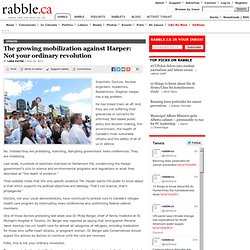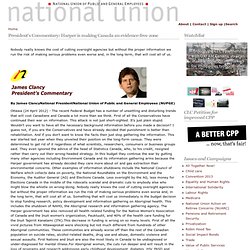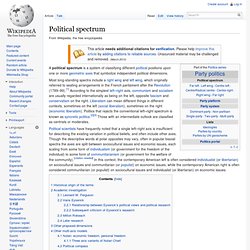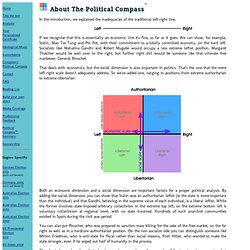

The growing mobilization against Harper: Not your ordinary revolution. Scientists.

Doctors. Nuclear engineers. Academics. Researchers. Stephen Harper has a big problem. He has ticked them all off. No. Last week, hundreds of scientists marched on Parliament Hill, condemning the Harper government's cuts to science and environmental programs and regulations or what they described as "the death of evidence. " Their website notes that the only specific evidence "Mr. Doctors, not your usual demonstrators, have continued to protest cuts to Canada's refugee health care program by interrupting news conferences and confronting federal cabinet members.
One of those doctors protesting last week was Dr. Folks, this is not your ordinary revolution. There were indications that Mr. Academics. This is no surprise given how much this government has held facts and science in such contempt. There is a growing list of Canadians who are denouncing the direction Prime Minister Stephen Harper is taking the country. Dr. Dr. Last week, Canada's premiers will met in Halifax. President's Commentary: Harper is making Canada an evidence-free zone. Nobody really knows the cost of cutting oversight agencies but without the proper information we run the risk of making serious problems even worse and, in the long term, that will cost all of us.

By James ClancyNational PresidentNational Union of Public and General Employees (NUPGE) Ottawa (24 April 2012) - The recent Federal Budget has a number of unsettling and disturbing trends that will cost Canadians and Canada a lot more than we think. First of all the Conservatives have continued their war on information. This attack is not just short-sighted. It's just plain stupid. James ClancyNational President James Clancy is the National President of the 340,000-member National Union of Public and General Employees (NUPGE).
Political spectrum. A political spectrum is a system of classifying different political positions upon one or more geometric axes that symbolize independent political dimensions.

Most long-standing spectra include a right wing and left wing, which originally referred to seating arrangements in the French parliament after the Revolution (1789–99).[1] According to the simplest left–right axis, communism and socialism are usually regarded internationally as being on the left, opposite fascism and conservatism on the right. Liberalism can mean different things in different contexts, sometimes on the left (social liberalism), sometimes on the right (economic liberalism). Politics that rejects the conventional left–right spectrum is known as syncretic politics.[2][3] Those with an intermediate outlook are classified as centrists or moderates.
Historical origin of the terms[edit] Originally, the defining point on the ideological spectrum was the ancien régime ("old order"). Academic investigation[edit] Redefining the Political Spectrum. Redefining the Political Spectrum - The Rational Spectrum By - June 20, 2004 One of the major problems in American political consciousness today comes from a misrepresentation of the political spectrum. This is partly the result of a deliberate effort to put all of America's enemies (fascists and communists) into the same basket after World War II, and a deliberate effort by the American "Right" to classify everything that they oppose as "Leftist".
After World War II the Republican Party was struggling for survival and was in the process of reinventing itself. Though various political spectrums have been developed in America, they all leave something to be desired and many actually reinforce political misperceptions. One of the first things that has to be done in order to properly understand the full spectrum of political ideas is to correct the popular misconception of the term "liberal" in America.
Today in America this concept may be more often thought of as "libertarianism. " Political Compass - Analysis. In the introduction, we explained the inadequacies of the traditional left-right line.

If we recognise that this is essentially an economic line it's fine, as far as it goes. We can show, for example, Stalin, Mao Tse Tung and Pol Pot, with their commitment to a totally controlled economy, on the hard left. Socialists like Mahatma Gandhi and Robert Mugabe would occupy a less extreme leftist position. Margaret Thatcher would be well over to the right, but further right still would be someone like that ultimate free marketeer, General Pinochet. That deals with economics, but the social dimension is also important in politics. Both an economic dimension and a social dimension are important factors for a proper political analysis.
You can also put Pinochet, who was prepared to sanction mass killing for the sake of the free market, on the far right as well as in a hardcore authoritarian position. A Word about Neo-cons and Neo-libs.